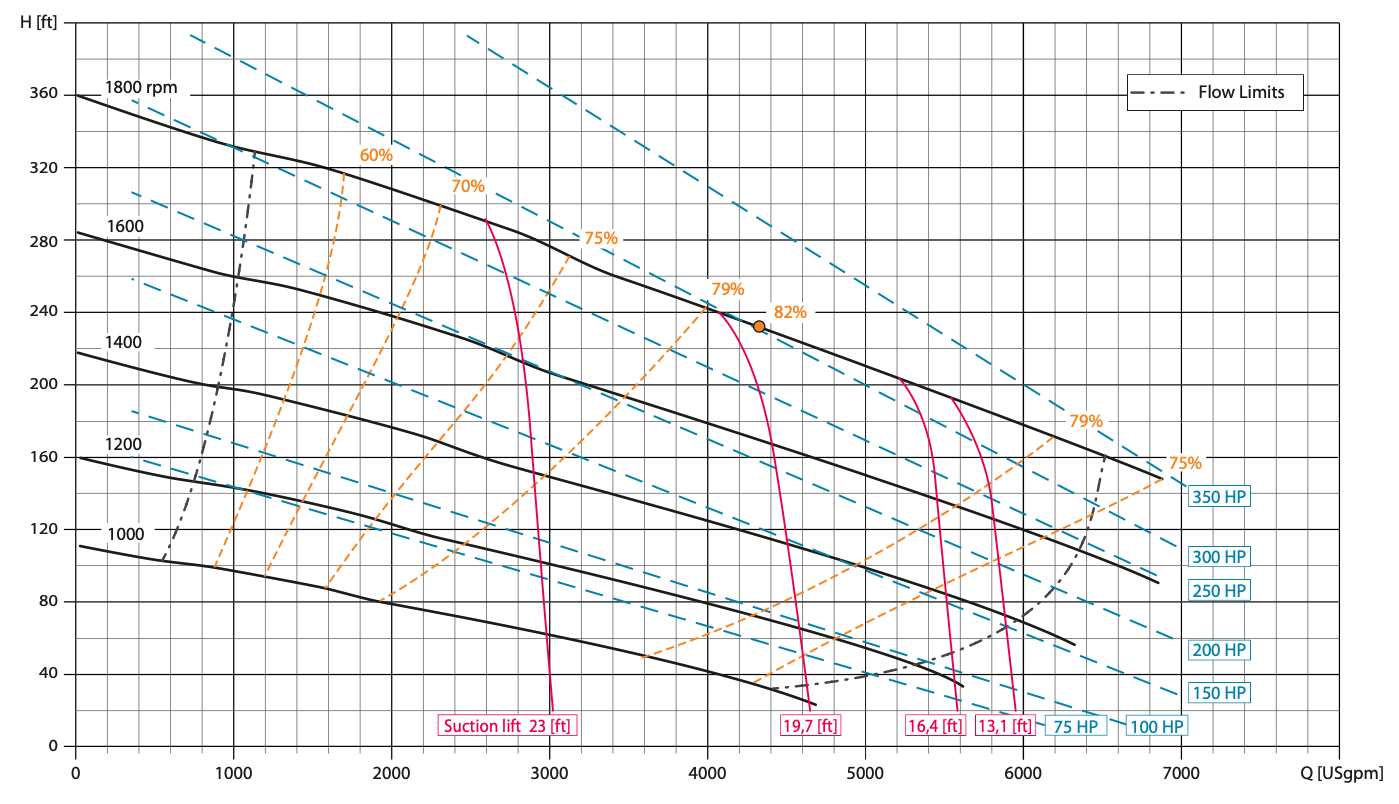
The PAC Electric Atlas Copco pump series is designed to withstand toughest applications and delivers best in class pumping efficiency. One of the most common area of utilization is the Construction dewatering and municipal market segment where reliability, serviceability and versatility is the key to provide a customized solution. Other suitable applications can be found within the Industry, Mining or Oil & Gas segment. Atlas Copco pumps are packed with features that not only meet, but exceed the needs of our customers.
| Pump | |
|---|---|
| Model | PAC H108 E 350HP |
| Qmax | 6,400 USgpm |
| Hmax | 360 ft |
| Q max eff. | 4,270 USgpm |
| Eff. max | 82% |
| Suction port | 10" Flange - ANSI class 150 |
| Delivery port | 8" Flange - ANSI class 150 |
| Impeller type | Closed, 2 vane |
| Impeller diameter | 17" |
| Solids handling | 3.5" |
| Material | |
| Casing | ASTM A536 ductile iron |
| Impeller | ASTM A743 CA6NM |
| Wear Ring | ASTM A48 Class 20 cast iron |
| Wear Plate | ASTM A48 Class 20 Grey Iron + NBR rubber coating |
| Shaft | AISI 630 stainless steel |
| Mechanical Seal faces | Silicon carbide Vs Silicon carbide |
| Elastomers | VITON |
| Check Valve | ASTM A536 ductile iron + NBR rubber flap |
| Separator | Steel |
| Priming System | |
| Vacuum pump | |
| Vacuum pump type | Diaphragm |
| Nominal air capacity | 50.0 cfm |
| Max vacuum | - 26.6 inHg |
| Drives | Link belt |
| Engine | |
|---|---|
| Make | Weg |
| Type | Three Phase Induction Motor |
| Cooling Method | IC411 - TEFC |
| No. poles | 4 |
| Tension supply | 460 V |
| Frequency | 60 Hz |
| Rated Power | 350 HP |
| Rated Speed | 1,790 rpm |
| Rated Current | 384 A |
| Efficiency class | W22 NEMA premium efficiency |
| Max Effiency | 96.2% |
| Protecting rating | IPW55 |
| Insulation class | F |
| Thermal Protection | Product Reference |
| Duty Cycle | Continuous - S1 |
| Arrangement | |
| Technical data | |
| Material | ASTM A36 steel |
| Coatings | Epoxy powder, average thickness of 3 MIL |
| Features | Lifting beam. Fork lift pockets. Pump access through hinged door. |
| Dry weight | - lbs |
| Speed | Impeller Dia. | Style | Solids Dia. | Ns | Suction | Discharge | No. Vanes |
| Various | 17" / 440 mm | Enclosed | 3.5" / 89 mm | 1800 rpm | 10" / 250 mm | 8" / 200 mm | 2 |



| Efficiency |
Solids handling |
Serviceability |
| The 17" impeller with 82% efficiency at B.E.P. provides best pumping result with minimal efforts | Closed impeller type with solids handling capability of 3.5" for trouble free operation | Semi cartridge seal and bolted front wear ring for easy service |
Bypass pumping involves maneuvering liquid (sewage, trash, water, etc.) around a damaged pipe without interrupting the flow of liquid while the repairs are underway. This process is critical for many rehab projects, as it allows for a pipe to be repaired or replaced without spillage on public or private property. Bypass pumping uses a PAS HF, which is a centrifugal pump that can handle liquids containing solids of up to 1.8". Because of this, the PAS HF pump is well suited for bypassing in construction, industrial, and municipal applications.
Bypass is common in these sectors:
Solids can build up at wastewater treatment plants or places a digestor is used over time as they settle out with solids. The build-up of solids, sludge, and stringy material in digester tanks can negatively impact the operation of digesters. This requires the right pump, usually with an open impeller to get a clean, easily flowing body of water.
Areas for Digestor cleanouts :
Site dewatering is the process of taking and removing water from construction sites, quarries, mine shafts, or any other area. Extracting water from these areas is crucial to maintain a safe working environment as well as reduce any costly delays.
Due to the PAS' ability to handle pumping high volumes, this pump is able to displace not only water, but sewage, industrial waste, chemicals, and even some solid products.
Areas for site dewatering :